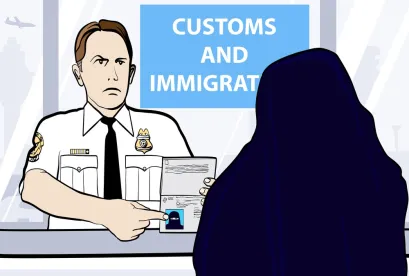On Friday, January 27, 2017, President Trump signed an executive order (EO) entitled “Protecting the Nation from Foreign Terrorist Entry into the United States.” This order, which took effect upon signing, halted all refugee admissions for 120 days, permanently suspended refugee admissions from Syria, and temporarily barred entry for 90 days of nationals from seven Middle Eastern and North African nations. As these orders were implemented, chaos broke out at the nation’s airports and ports-of-entry causing myriads of foreign nationals to either be subject to enhanced questioning, detainment, or even deportation from the United States. Several lawsuits were quickly filed that affected the order, but as of the date of this writing the vast majority of the substance of the President’s decree remains in effect.
The order, as summarized, entails:
-
A complete temporary suspension of all refugee admissions; an indefinite suspension of Syrian refugee admissions; and a temporary entry ban to all foreign nationals of the following countries: Syria, Iran, Iraq, Libya, Somalia, Yemen, and Sudan. The EO also covers nonimmigrants and immigrants (i.e., permanent resident or “green card” holders); however, DHS issued a statement that admitting green card holders affected by the ban was in the “national interest,” but also expressly reserved the right to refuse their admission on a case-by-case basis.
-
Certain exceptions are allowed for “religious minorities” and others who can establish that they would suffer an undue hardship if their entry to the United States were to be refused.
-
The EO also portends that big changes could be coming for the refugee admission process as a whole, and also for how visas are processed within certain “countries of concern,” predominantly in the Middle East. President Trump ordered the heads of DHS and DOS to prepare reports on countries to possibly be added to the travel ban list. The number of refugee admissions for fiscal year 2017 was also lowered from 100,000 to 50,000.
Numerous lawsuits were filed almost immediately in reaction to the EO, and several favorable judicial temporary restraining orders were issued. The orders do not bar the entire implementation of the President’s order, but do allow for the admission of certain affected classes of aliens seeking admission. The orders vary slightly depending on which court issued them, but in essence they state that certain aliens with valid visas and travel documents at the time of the order should be allowed entry to the United States. However, these temporary orders are just that—temporary—and they may expire if further legal action is not soon taken.
What To Do?
If you are a foreign national from any of the seven countries listed above, you should not travel outside of the United States under any circumstances as the chances of gaining reentry are slim. This applies even if you are a permanent resident as there is no guarantee that you will be readmitted even with a green card and/or valid immigrant visa in your passport. Any foreign nationals affected by the ban that are currently outside the United States should immediately return before February 4th (the date the current temporary restraining order expires), or run the risk of not being able to reenter for at least approximately 90 more days.
More so, at no time should foreign nationals sign any documents given to them by CBP or ICE officers asking them to relinquish their permanent residency—the standard response to such a request should be, “I’d like to see my lawyer, please.”
In addition, reports are trickling in that USCIS has immediately halted the adjudication of all “I-Forms” (such as forms I-485, I-129, I-765, etc.) filed by nationals of the seven countries named above. While no official guidance has been released by DHS or USCIS on this front yet, all indications are that such applications will be indefinitely put on hold until further notice.
Further updates will be provided as the situation develops. In the meantime, all international travelers and applicants for immigration benefits should expect delays when entering the United States and/or in the adjudication of their benefit requests.
If you are unsure about how this ban affects your particular situation, contact a licensed immigration attorney as soon as possible and certainly before any travel abroad.
How Are Businesses Affected?
Top employers in the United States (especially those in the tech industry) immediately put out a call for all foreign workers who could possibly be affected by the EO to either return to the United States immediately or to forestall any international travels plans for the immediate future, depending on their locations when the order was signed. Employers such as Amazon and Apple are reportedly “weighing legal options” against the Trump administration in the wake of the EO, as Amazon CEO Jeff Bezos clearly stated that “[t]his executive order is one we do not support.” Mirroring these sentiments, Apple CEO Tim Cook stated in an interview with The Wall Street Journal that he was also “considering legal options,” while numerous other companies such as Facebook, Google, Microsoft, Uber, and Netflix have all spoken out against the EO.
The President’s EO does not just affect mega-corporations, however, as many medium and small start-ups and other businesses employ foreign nationals in highly-skilled and high-paying professional positions. More so, a leaked draft of a forthcoming EO from the President’s office indicates that changes may be coming to the statutory and regulatory regime currently governing the hiring of foreign workers and entrepreneurs. Also, as stated above, certain petitions for alien workers from affected countries have been indefinitely placed on hold, meaning that numerous businesses will be forced to look elsewhere for now for the high-skilled labor they so desperately need.a





 />i
/>i
